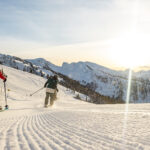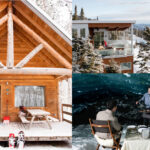Last winter’s tragedy at Golden, where a Quebec couple disappeared off-piste at Kicking Horse, will have a lasting impact on search-and-rescue operations
Whether it’s the macabre or the simplicity of a mystery, the idea of a missing person can grab big headlines in the media. It’s the stuff of TV shows, movies, books, folklore—and magazines. Every year, with outcomes that vary from relief to grief, countless sailors, fishermen, hitchhikers, experienced and inexperienced users of the backcountry, even skiers, get lost, and it’s up to others to find them. Last year’s accident in Golden, B.C., was no exception.
The opening page on Kicking Horse Mountain Resort’s website is like many ski areas nowadays, with photos and video of virgin off-piste powder, steep lines and breathtaking mountain beauty with nary a soul around. The copy is both poetic and convincing: “There are no tracks. You invent the runs. You dance with Gravity.” Unlike many resorts, however, the webpage also leads drooling takers to the Kicking Horse Big Mountain Centre offering “guiding and experiential education for the untracked parts of our mountain.”
The two skiers central to this story didn’t take the resort’s advice to hire a mountain guide and chose to do what most good skiers do at most big western ski areas: they saw some tracks, saw no avalanche or closed signs—and ducked the ropes.
It was their only day to ski Kicking Horse, and skiing off-piste was undoubtedly going to be part of the experience, normally a relatively harmless and common decision for lift-served Rocky Mountain slackcountry cowboys. In unfamiliar terrain, however, they skied over the resort’s backside into Canyon Creek Valley and became hopelessly lost. Despite their SOS signs in the snow and an indomitable will to survive, eight days later one died of hypothermia and the survivor was picked up two days after that.
When news broke across Canada last February that the Quebec couple who skied out-of-bounds at Kicking Horse Mountain Resort wasn’t discovered until the tenth day of their tragic ordeal, people were stunned. The public was horrified upon learning that SOS signs had been cited but ignored.
It was supposed to be a romantic ski trip to celebrate 22 years of marriage for 51-year-old Gilles Blackburn and his 44-year-old wife, Marie-Josée Fortin. Only one day after Valentine’s Day, the experienced skiers got off the Stairway to Heaven chair at Kicking Horse and made their first dangerous decision. Mentioning their route to no one, they followed tracks beyond the resort’s boundary rope at midday and skied down into the Canyon Creek valley. With them, they had two granola bars. No water, no matches—and a lot of bad luck.
It was the beginning of a survival ordeal in the wilderness that would ultimately end with Fortin’s death from hypothermia, Blackburn’s rescue two days later and a flurry of finger-pointing, including a highly controversial civil lawsuit against the RCMP, Golden Search and Rescue (SAR) and Kicking Horse Mountain Resort.
(magenta28)
POSTED 2009/07/09 CBC
“To say that they should not have answered the SOS is like saying,‘OK,you decided to drink and drive so if you get in a car accident we will not help you.’”
“What I did [skiing off-piste] was my fault,” Blackburn told the Montreal Gazette March 4. “I’m to blame for that on the 15th. But after that, on the 17th, on the 21st, when the police knew [we] were lost and didn’t come to help, that is not my fault.”
After all, most Rocky Mountain-savvy skiers would tell someone where they were going, consult with the ski patrol, or at the very least ask a local to make sure there was an exit route back to the resort before heading off-piste. A mistake at any big ski area could mean a brutal bootpack back up the way you skied down. It’s a decision that can potentially cost you a freezing cold night in the wilderness. But few expect it to lead to death. Although it was the first time either had skied at Kicking Horse, Blackburn had lived in Alberta and B.C. for six years in the 1970s and was familiar with skiing the Rockies.
*******************************************************
Many who know the story ask, “Who among us would ignore an SOS sign?” Imagine sailing near some deserted island and seeing the enormous weight of a simple SOS message in the sand. Do you report it, investigate or pass it off as a hoax? A stumbling drunk weaves past you on a crowded city sidewalk. Do you simply veer around him thinking that there’s an idiot who should take responsibility for his own actions? Do you second-guess yourself later when you’re home and comfortable and you read that stroke victims can appear drunk?
And what of skiers who get into trouble? Few complain about the cost of rescue when snowmobilers, hunters, boaters, hikers, campers or adventurer-seekers become lost and require massive search efforts. So why is it that skiers bear an extra level of rescue criticism and accountability? This is particularly true among their brethren. Chairlift chatter and chat rooms, blogs and follow-up logs to media stories were jammed with caustic commentary after the incident. After the lawsuits were announced, the opinions became exponentially louder. The fact remains, however, that unless you’re passing a temporary or permanently Closed sign, it’s not illegal to ski, snowshoe or hike under the ropes beyond a ski area boundary onto Crown land.
In the biggest twist to the missing persons story, the Blackburn civil lawsuit has rocked the volunteer search and rescue world, raising the scary spectre of insurance and liability, along with personal soul-searching. One ski patroller from Kicking Horse said he is far too upset to even talk about it, even off the record.
A husband lost a wife, two teenagers lost their mother and there were more questions than answers: “What were they thinking?” to “What took them so long?” Decisions, taken at every step of the way by Blackburn and Fortin, were undoubtedly dangerous. But luck was never on their side. A series of decisions and enormous communication goof-ups between Kicking Horse Mountain Resort, Golden Search and Rescue and the RCMP ultimately risked two lives, and claimed one of them. The question of whether it was mistake or negligence will now be decided by lawyers and a judge.
(SKINDRED)
POSTED 2009/05/08 CBC
“YOU SHOULD FEEL GUILTY!!! Now stop blaming the RCMP and take responsibility for your own stupid actions.”
*****************************************************
Cognitive dissonance is a term that’s not used in everyday conversation, but might best capture the confusing situation in Golden. Before you pull out the psychiatrist couch, it’s something most of us do, sometimes daily, to rationalize or justify our actions. Inherently, we all believe that we’re reasonable people, so by default our actions have to be reasonable.
The dissonance is the difference between what others see as reasonable and what you are doing, which leads to internal rationalization to deal with feelings of anxiety, guilt, shame, anger, embarrassment and stress. Everyone makes mistakes and we all rationalize our behaviour so we can continue believing in ourselves and avoid second-guessing every decision made. Cognitive dissonance is not unique to this tragedy.
“Ducking the ropes is a relatively harmless and common decision,” one experienced rescuer told Ski Canada. But the finger-pointing after the fact, as agencies and authorities clung to protocol, “are all rationalizations to bridge the gap between this colossal fuck-up and how people live to go to work the next day. They tell themselves it’s not their fault.”
Turf management squabbles, shouting matches, political red tape, bad blood and egos. That’s the quiet word across mountain communities in the Canadian Rockies. Rescue operations often get vague reports of missing people, but they generally get the wheels rolling before official authorization arrive. It may turn out to be a wild-goose chase, but the ramifications of not setting out are heavy. One would have a hard time finding an example of a hoax where an SOS sign in the backcountry was involved.
“There’s a moral obligation if there is an SOS,” said Rudi Gertsch, owner of Purcell Helicopter Skiing and a certified Canadian Mountain Guide. “When someone’s in trouble, we help first then ask questions later.” For the last 35 years, Gertsch has flown over that area every day, all winter, taking clients to ski the kind of light, dry powder and spectacular terrain for which the B.C. backcountry is known, celebrated and marketed. On February 17, two days after the Quebec couple had taken the fateful decision to follow tracks under the boundary ropes, odd-looking ski tracks and an SOS sign were sighted in the snow in Canyon Creek valley by Gertsch’s son Jeff. The mountain guide and several friends were backcountry skiing in the area and staying at a remote mountain hut when he radioed the SOS sighting to his father. Rudi Gertsch immediately reported it to the staff of Kicking Horse Resort, asking if there were any reports of missing skiers. There weren’t.
According to the statement of claim filed by Blackburn’s lawyer, Nancy Wilhelm-Morden, Kicking Horse Mountain Resort notified the search and rescue that same day. (Wilhelm-Morden is a personal injury litigation lawyer in Whistler and a past town councillor.)
Kyle Hale, an avalanche forecaster and a member of the mountain safety staff at Kicking Horse, spoke to Ski Canada in his role as manager with Golden Search and Rescue. “We’d heard third-hand that there was an SOS, but we were never contacted by the RCMP,” said Hale. “It’s not uncommon for us to have events reported directly to us, like an overdue skier or snowmobiler, and we tell people they need to contact the RCMP.”
Golden Search and Rescue’s 35 volunteers are on call 24/7, as well as dedicating their free time to developing and maintaining rescue and safety skills, said Hale. They have to be “called out” by an official tasking agency, such as the RCMP, ambulance, fire department, Parks Canada or the Department of National Defence. In this case they weren’t.
“We get hundreds of calls a year, so it’s not like we’re trying to drum up business,” said Hale. “We don’t run out the door when we hear that somebody is in trouble. We need to be contacted by an official agency.”
In the meantime, the national media was interviewing Blackburn and his brother and reporting Fortin and Blackburn ate leaves and snow to survive, built shelters and even took the basket off a ski pole to fight off what they believed were wolves, which were tracking them.
Blackburn’s family still had no idea the couple was missing. They’d checked out of their accommodations after their one-night stay, but left the rental car in an underground parking garage where it went unnoticed.
“They were totally lost,” said Rudi Gertsch. “Once you get into the tall trees, some of them are 100 feet at least, if you’re in there you can’t see the mountains.” They may have circled the valley for more than 20 km, travelling in the direction they saw helicopters, and following a frozen riverbed at one point mistakenly thinking it would lead them out. The couple encircled the very cabin (as close as a few hundred metres) where Jeff Gertsch and friends were staying. They tramped out several more SOS signs in the snow with letters three to four metres tall, and another signal was spotted on February 21 and reported to Purcell Helicopter Skiing. Gertsch called 911 and reported it to the RCMP. They reported the sighting to SAR, yet the RCMP decided not to call out an official rescue.
“There’s an error on the part of the RCMP for not initiating a callout on February 21,” when the second and third SOS signs were spotted, RCMP Corporal Dan Moskaluk told The Globe and Mail last spring.
All parties sat in on a meeting only the previous month and Rudi Gertsch was warned that if he didn’t follow search-and-rescue protocol he could face legal ramifications. “I was threatened to be thrown in jail,” said the Swiss mountaineer, well known for his strong opinions. Like everyone involved, Gertsch hopes all the details will come out in a coroner’s investigation, so that further tragedies can be prevented.
“If they said, ‘Rudi, we’re not interested,’ then tell me, and I would have gone out [and searched]. It’s unacceptable when an SOS is reported and ignored,” said Gertsch, “especially when it’s from someone reliable, with 35 years’ experience in the mountains. It’s not just some kid high on drugs who reported it.”
The next day, February 22, Fortin, a wife, registered nurse and mother of two teens, took her last breath and according to the autopsy died of hypothermia. It wasn’t until the following day the family officially reported Blackburn and Fortin missing.
Two days after Fortin succumbed in the wilderness, Rudi Gertsch, with a helicopter full of skiers, thought he’d fly over the area a little lower and look for tracks just before a snowstorm was due. By sheer luck, they spotted Blackburn and called the GPS co-ordinates into the RCMP. This time help was dispatched in a helicopter with two search-and-rescue volunteers, Hale included. Blackburn was taken to hospital in Golden and another helicopter returned to collect his wife’s body. It was February 24 and 10 days had elapsed.
*******************************************************
“The lawsuit and its aftermath brought about a big ‘ah-hah’ moment for search-and-rescue organizations,” Hale said. Volunteer organizations assumed they were covered by the Good Samaritan Act at the very least, as well as by B.C.’s third-party liability insurance. “We’d always been led to believe that the province had the backs of volunteers and that’s not the case.” It was a shocking and dispiriting discovery. Many volunteers did some heavy soul-searching, threatening to withdraw services rather than put their houses on the line the next time they were called out to a rescue.
“It almost destroyed our organization and it was weeks away from toppling the entire search-and-rescue community in B.C.,” said Hale. “A lot of people are a lot more skeptical now.”
(LIVININPARADISE)
POSTED 2009/06/17 CBC
“I used to have sympathy for Mr. Blackburn, now along with the lawsuit, his lawyer and himself can shove that everloving basketless ski pole up their…”
By the end of August, the B.C. government stepped up and kicked in $180,000 from lottery funds, but search-and-rescue organizations still haven’t found a permanent solution, such as rewriting legislation for coverage similar to the RCMP, ambulance and other agencies. Sparked by the Golden controversy, the Alberta government announced in October that it intends to have a plan in place for protecting search-and-rescue volunteers from liability by the end of 2009.
Wilhelm-Morden, Blackburn’s lawyer, filed two statements of claim June 11 (one on behalf of Blackburn and another for his two children) against the RCMP, Golden and District Search and Rescue Association and Kicking Horse Mountain Resort, “all equipped with the knowledge of the SOS Signals…all negligently failed to initiate or conduct a search for the plaintiff or Ms. Fortin or otherwise properly investigate the source and significance of the SOS Signals.”
Because the case is before the courts, Blackburn wouldn’t speak with Ski Canada, a far cry from the flurry of interviews that claimed headlines in the days and weeks following the incident. The RCMP and Golden Search and Rescue could not address specific details that were pertinent to the lawsuit, and Kicking Horse Resort declined to comment as well. But there’s still plenty to read online.
“It’s outrageous, some of the things that have been said on the Internet,” Wilhelm-Morden told Ski Canada. “Some people say, ‘Well, he went under the ropes and he deserved what he got.’ How can people say things like that?” She reminds us that the B.C. government markets and promotes the province as the most beautiful place on earth because of the wilderness and encourages ordinary people to go out and enjoy it.
Now it’s up to the B.C. courts to decide who’s ultimately to blame for the tragedy, while those who live in the mountains ponder how to make the system work better when someone goes missing.



